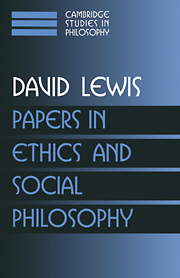Book contents
- Frontmatter
- Contents
- Introduction
- 1 Semantic analyses for dyadic deontic logic
- 2 A problem about permission
- 3 Reply to McMichael
- 4 Why ain'cha rich?
- 5 Desire as belief
- 6 Desire as belief II
- 7 Dispositional theories of value
- 8 The trap's dilemma
- 9 Evil for freedom's sake?
- 10 Do we believe in penal substitution?
- 11 Convention: Reply to Jamieson
- 12 Meaning without use: Reply to Hawthorne
- 13 Illusory innocence?
- 14 Mill and Milquetoast
- 15 Academic appointments: Why ignore the advantage of being right?
- 16 Devil's bargains and the real world
- 17 Buy like a MADman, use like a NUT
- 18 The punishment that leaves something to chance
- 19 Scriven on human unpredictability (with Jane S. Richardson)
- Index
8 - The trap's dilemma
Published online by Cambridge University Press: 24 December 2009
- Frontmatter
- Contents
- Introduction
- 1 Semantic analyses for dyadic deontic logic
- 2 A problem about permission
- 3 Reply to McMichael
- 4 Why ain'cha rich?
- 5 Desire as belief
- 6 Desire as belief II
- 7 Dispositional theories of value
- 8 The trap's dilemma
- 9 Evil for freedom's sake?
- 10 Do we believe in penal substitution?
- 11 Convention: Reply to Jamieson
- 12 Meaning without use: Reply to Hawthorne
- 13 Illusory innocence?
- 14 Mill and Milquetoast
- 15 Academic appointments: Why ignore the advantage of being right?
- 16 Devil's bargains and the real world
- 17 Buy like a MADman, use like a NUT
- 18 The punishment that leaves something to chance
- 19 Scriven on human unpredictability (with Jane S. Richardson)
- Index
Summary
The Bicentennial year is a fit time to recall an early contribution to ‘regional philosophy’. In the year 1879 Edward Kelly put forward this ingenious argument.
I would like to know what business an honest man would have in the police. A man that knows nothing about roguery would never enter the force and take an oath to arrest brother, sister, father, or mother if required and to have a case and conviction if possible. Any man knows it is possible to swear a lie. And if a policeman loses a conviction for the sake of [not] swearing a lie he has broken his oath. Therefore he is a perjurer either way.
At first glance, Kelly's example seems to fit right into present-day discussion of moral dilemmas, as follows. If the unfortunate policeman has taken an oath that obligates him to swear a he under certain circumstances, and if those circumstances arise, then he has no right course of action. Either he takes a second oath to tell the whole truth and nothing but, and then he breaks it by lying; or else he doesn't, and thereby breaks his first oath to do everything possible to secure a conviction. Kelly's conclusion also looks familiar: it is because of his previous wrongdoing that the policeman afterward has no right course of action. An honest man would never have taken the first oath.
I think this first glance is misleading.
- Type
- Chapter
- Information
- Papers in Ethics and Social Philosophy , pp. 95 - 100Publisher: Cambridge University PressPrint publication year: 1999



